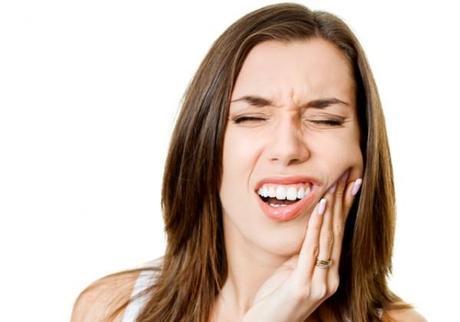Sensitive teeth can keep you from enjoying your foods. Try natural solutions that soothe pain and improve gum health.

Home Remedies For Sensitive Teeth
Teeth sensitivity is a widespread problem and can cause gnawing pain and discomfort while your teeth come in contact with very hot and cold food. Dealing with tooth sensitivity is a widespread problem. But what many patients don’t realize is that their choices at home can either help or hinder the dilemma. For millions of people, sensitive teeth can make life miserable. The pain and discomfort make even favorite hot or cold foods impossible to enjoy. All is not lost. In many cases, sensitive teeth can be successfully treated bringing long sought after relief.
Also known as dentin hypersensitivity, sensitive teeth are characterized by sharp pain that causes you to bring your hand to your mouth to cushion your teeth. Nerve damage or habitual tooth grinding may promote this condition, but the root cause is usually enamel loss or gum line recession. Fortunately, there are several home remedies for sensitive teeth.
Use Fluoride Mouthwash And Toothpaste
Fluoride is known to protect tooth enamel and also prevents tooth decay. Fluoride containing products are also known to decrease teeth sensitivity. Use a mouthwash containing fluoride or brush your teeth with a fluoridated gel or toothpaste.
Baking Soda
Damaging the enamel will put the teeth under risk of damage. Teeth will soon become sensitive and cause pain and discomfort. If you have excess saliva or low saliva production in your mouth, this can lead to softening of the teeth and aggravate the sensitivity problem.
Use Desensitizing Toothpaste
The best way to reduce your teeth sensitivity is by using desensitizing toothpaste. These are widely available in the chemist shops or super stores. Desensitizing toothpaste contains chemicals that block the hot or cold sensations from reaching the nerves in the teeth.
Salt Water Remedy
To a glass of lukewarm water add 2 teaspoon salt. Mix well to dissolve. Rinse your mouth with this solution in the morning and later during bedtime. This remedy is based on Ayurveda principles. It is natural, safe and easy to try at home.
Desensitizing Toothpaste
Try brushing with over-the-counter toothpaste formulated to desensitize the teeth. These pastes contain strontium chloride or potassium nitrate as the active ingredient. Either one helps to block the uncomfortable sensation from traveling from the tooth to the nerve. While these pastes can’t replenish lost enamel or compensate for recession of the gums, their active ingredients collect in the channel-like tubules in your dentin and act as temporary fillers.
Sealants
Sealants are used for sealing the teeth so that the nerves are not irritated when you eat cold or hot foods. Sealants or bonding agents are normally made of a plastic material and act as a barrier to the teeth, protecting it from sensitivity. A dentist can apply the sealant on your tooth when you have teeth sensitivity.
Practice Good Oral Hygiene
Maintain a good oral hygiene by brushing your teeth twice daily, preferably in the morning and right after food or bedtime. Also make get into a habit of flossing once a day. Plaque that forms a layer on your teeth produces acid that might cause irritation to the teeth.
Floss Regularly
If you have enough dental floss in the bathroom medicine cabinet to go around the world three times, then it’s time to taking flossing seriously. Regular flossing after brushing helps to remove materials that the toothbrush misses. Unless it’s removed, it will turn to hardened plaque within 72 hours and can only be removed by a dentist. Meanwhile, the plaque will irritate your teeth and cause sensitivity.
Soft Toothbrush
Using a soft toothbrush is very important while you have sensitive teeth. Along with one of these home remedies, it is imperative that you choose your toothbrush with care. Toothbrushes with hard bristles can cause the enamel to erode more and the nerve to get irritated further. Therefore, ensure that you use a soft bristled toothbrush always, to protect your enamel and also to prevent further aggravation as well. While you use a soft bristled tooth brush, brush with an up and down motion to remove the plaque effectively.
